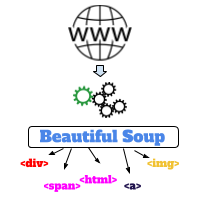Python Tutorial :#2 Python Vs Java
As we know Python and Java, Both the languages are powerful and both the languages provide many great frameworks. But the question is when to use which language? So, in this article we are going to some see main differences between Python and Java.
1.Overview
Python was first released in 1991 and developed by Guido van Rossum. It is an interpreted, high-level, Object-Oriented and general-purpose programming language.
Java was released in 1995, developed by James Gosling at Sun Microsystems, as a part of Sun Microsystem’s Java Platform. It is a high level, class based, object oriented and general-purpose programming language.
2. Typing:
Python is Dynamically typed general-purpose language and Java is Statically typed general purpose language. It means that, In Python no need to declare the variables before using it. But as Java is statically typed language, we need to declare all the variables before using it. This means java is stricter about how variables ate defined and used in the program.
First, in Python, we’ll create an array with some data in it, the data will be string and integer, and we will print it to the console.
|
1 2 3 |
Name_age = ["john","peter",35,40] for i in Name_age: print(i) |
Output:
|
1 2 3 4 |
john peter 35 40 |
In Python, it is allowed to put two strings and an integer in the same array, so we have taken mix data type in one array and then printed the contents. We can mix them in Python array it won’t give any error.
It’s up to programmer to use the data correctly, what happens if one misuse the data? we will see this with a small example.
Example:
|
1 2 3 |
Name_age = ["john","peter",35,40] for i in Name_age: print(i + "Employee information") |
Above code will throw following error at run time.
Output:
|
1 |
TypeError: unsupported operand type(s) for +: 'int' and 'str' |
It means we can’t append integer with a string. So, in Python data misused by programmer will not found until that particular line of code is triggered.
Now write down same example in Java :
|
1 2 3 4 5 6 |
public class Main { public static void main(String[] args) { String Name_age[] = {"john", "peter", 35, 40 }; System.out.println(Name_age[0]); } } |
We can’t mix types in a Java array. The code won’t compile. It will give following error:
Output:
|
1 |
error: incompatible types: int cannot be converted to String |
So, which one is best? Static or Dynamic?
If you don’t want to mix int and string, Static typing catches type errors at compile time, we can say the Java compiler catches the mistake. So static typing nothing but enforce a discipline that some developers think useful. With static typing one can avoid run time error which boosts the code performance.
Opposite to this, the Code written with dynamic types tends to be less lengthy than static languages. Here Variables aren’t declared with any types, and if the type changes, it saves a copy or type conversion to new variable declarations.
3. Stability:
Though Python is easy to learn and understand and gives a quick development cycle, it tests everything at runtime (refer example from point no 2). Java provides higher stability than Python as it checks everything at compile time which provides stable software development and less prone to system crashes.
4. Syntax
To understand this, we will write down a simple program for addition of 2 numbers using Java and Python.
In Java :
|
1 2 3 4 5 |
public class test { public static void main (String args[ ] ) { System.out.println("5+2=" + (Integer.toString(5+2))); } } |
In Python:
|
1 2 3 |
5+2 7 |
From above examples we can easily say that Python has a very easy syntax as compared to Java.
In Java, to write down this basic program one should write down class, public static void main (String args[ ] ) , System.out.println() etc. It follows strict syntax rules, as we have seen in previous point java is a statically typed language where you need to explicitly declare all the variables, java needs to compile the whole program to execute it and if some mis match happens, the code wont compile. So, for beginners, all these things are quite difficult.
Opposite to this in Python, same program is written in just 1 line, its syntax is more like English statement which doesn’t include semicolon or brackets (it uses indentation),
As we have seen in previous point Python is a dynamically typed language, when you write code, you don’t need to declare variable types, as the interpreter will gather these types and the checks will be made at runtime which makes the code easy, so this simplicity is useful for beginners.
5. Speed and efficiency
When it comes in terms of speed, Java is fast as compared to Python as it is a compiled language. This means before a java program runs, the complier translates the java code to byte code. Why java is efficient so the answer is its JIT (Just In Time) compiler. The role of JIT is to increase the performance of Java programs by compiling bytecodes into native machine code “just in time” to execute. Java Virtual Machine calls the compiled code directly. The compilation process does not need processor time and memory usage. It makes java program fast in performance wise.
By contrast, Python is an interpreted language. It determines the type of the variable at run time, which increases the workload of the interpreter, this is the main reason which makes python slow.
Conclusion:
Python is popular because of its simplicity, if you are beginner in the world of programming languages then Python should be your choice because it’s easy to learn and use. Python is used in web development, Python is suitable for Data science, Machine learning and Artificial Intelligence projects because of its simplicity and its huge collection of libraries. If project is large and launch time is a crucial factor then again Python will be a good choice. In terms of Performance, Python is below than Java so Python is not suitable for heavy applications.
Now Speaking in terms of performance and efficiency, Java wins over Python. If speed and efficiency is the target then Java will be a good choice. So, for the development of heavy/complex applications Java is a better choice than Python. Because of its performance Java is widely used in mobile applications, web applications, Financial and Banking applications.
| Python Vs Java | |
| Easy Syntax | Python |
| Performance | Java |
| Stability | Java |
| For beginners | Python |
| Large projects | Python |
| Complex/ Heavy projects | Java |




